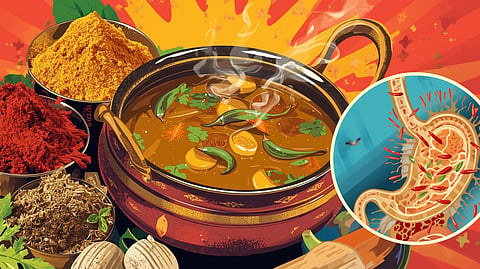

Many Indians avoid spicy food fearing it causes stomach ulcers. This article busts that myth, explaining how Helicobacter pylori bacteria are the actual cause. Learn how spicy food affects your stomach, the science behind ulcers, and practical tips to enjoy your favorite spices without worry.
For decades, a widespread belief in India has been that eating spicy food causes stomach ulcers. This myth has led many to curb their love for fiery curries, chutneys, and pickles. But what does modern research say? Is that fiery bite really harming your stomach lining, or is something else at play?
What Are Stomach Ulcers?
Stomach ulcers, medically known as peptic ulcers, are painful sores that develop on the lining of the stomach or the upper part of the small intestine. Symptoms include burning stomach pain, bloating, indigestion, and sometimes nausea.
The Real Culprit: Helicobacter pylori
Scientific studies have repeatedly shown that the primary cause of most stomach ulcers is an infection by a bacterium called Helicobacter pylori (H. pylori). This spiral-shaped bacterium survives the acidic environment of the stomach by burrowing into the mucous lining and causing inflammation. Over time, this weakens the protective layer and results in ulcers.
Does Spicy Food Cause or Worsen Ulcers?
Contrary to popular belief, spicy food itself does not cause ulcers. Capsaicin, the compound that gives chili peppers their heat, may cause temporary irritation or a burning sensation, but it does not create ulcers. In fact, some studies suggest that capsaicin might have protective effects by increasing blood flow to the stomach lining and promoting healing.
However, for those who already have ulcers or gastritis, very spicy food can aggravate symptoms like pain or discomfort. It’s similar to how hot beverages or acidic foods may irritate but not cause the underlying condition.
Why Does the Myth Persist?
Historically, since spicy food can cause a burning sensation, it became an easy target for blame. Moreover, because ulcers cause stomach pain, and spicy food can trigger or worsen that pain temporarily, people linked the two causally. Cultural practices and anecdotal advice have further reinforced this misconception.
Practical Tips for Spice Lovers
If you have an ulcer or digestive discomfort, it’s wise to moderate your intake of very spicy foods and observe how your body reacts. For example, incorporating milder spices like turmeric and coriander can add flavor without irritation. Using over-the-counter antacids or acid reducers, such as generic proton pump inhibitors, can help manage symptoms but consult your doctor for persistent issues.
Testing and Treatment
If you suspect an ulcer, getting tested for H. pylori is crucial. Diagnostic methods include breath tests, stool tests, or endoscopy. Treatment typically involves a combination of antibiotics to eradicate the bacteria and acid-suppressing medications to allow healing.
In Summary
Your love for spicy Indian food does not cause stomach ulcers. The primary cause is infection by H. pylori. Spicy food may cause discomfort in some cases but is not the root cause. Understanding this can help you enjoy your favorite dishes without guilt while focusing on proper diagnosis and treatment to maintain gut health.
Remember, good hygiene, safe food practices, and timely medical attention are key to preventing and managing stomach ulcers—not avoiding your beloved spices.
At marvelof.com, we spotlight the latest trends and products to keep you informed and inspired. Our coverage is editorial, not an endorsement to purchase. If you choose to shop through links in this article, whether on Amazon, Flipkart, or Myntra, marvelof.com may earn a small commission at no extra cost to you.
